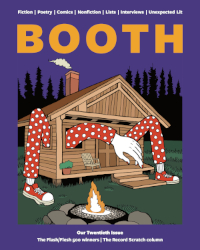by Liz N. Clift
1.
Dear Laika: When you were a pup, and living on the streets in Moscow, did you howl at the moon and the stars?
2.
Dear Laika: Did you have a person? Someone who secreted you scraps? I like to imagine a small child tossing you crusts of bread and the grisly parts of whatever meat their mother may have had. I like to imagine you thumping your tail as they approached, but eyes watchful, ready to run.
3.
Dear L: I always call my own dog pup, even though she is years beyond puppyhood.
It might be a way for me to pretend that I can prolong her life. That I haven’t already had more days with her than I have left with her
4.
L: I first read about you in elementary school. The book didn’t mention you died up there, so I imagined you still circling the Earth. Forty years and counting. Looking down on us. Lonely for humans and fresh kibble.
5.
You only made it to your fourth orbit around the sun. The ship was too hot—more than a hundred degrees, and humid. I imagine you trying to press your belly to the floor, and not being able to because of that whole weightlessness thing.
I imagine you shaking, the way my pup does when fireworks explode.
Maybe you thought about Yazdovsky’s children playing with you. Maybe you yearned for the pack of humans who’d comforted you after centrifuge tests.
6.
I know a little something about broken trust.
I know a little something about wishing the people who broke your trust would comfort you, the confusion and fear that follow.
7.
Laika: You didn’t blame yourself, did you?
8.
Here’s the thing, Laika. People aren’t like dogs. We do shitty things, and then we blame those we hurt for being hurt. Maybe we say it’s for science. Maybe we say it’s for the person’s own good.
It’s our way of lying to ourselves, because we can’t let ourselves imagine that maybe we’re really monsters.
Even the scientists who sent you into space said, decades later, they didn’t think it was worth it.
They never planned to bring you home.
9.
Here’s the thing, Laika. Most people believe the shitty things that are said and done to them are their fault.
Take, for instance, the days after I was raped. I spent hours looking up the definition of rape (was it really rape?). I spent day after day considering what I should have said or done differently earlier in the night. I spent months believing that my response, which was to go slack, was my fault.
I panicked whenever I saw a white pickup like his.
I panicked whenever something felt out of my control.
Sometimes, looking back, it seems like I spent the next two years either crying or being numb.
Because even when I said the right things: It’s not my fault. He did this to me. The person who is raped is not to blame—someone else made the decision to commit an act of violence. I didn’t really believe it.
I didn’t really believe it, because the world told me otherwise.
10.
It was not your fault.
You were not a bad dog.
11.
Dear L: People still love you. There are songs written about you. There’s a comic, in which you are a hero—so much so that the man who made the comic had to write an alternate ending because no one liked the one where you died.
12.
Maybe part of the reason so many people want you to come home is because we want to believe, in the face of all evidence to the contrary, that the world is just.



